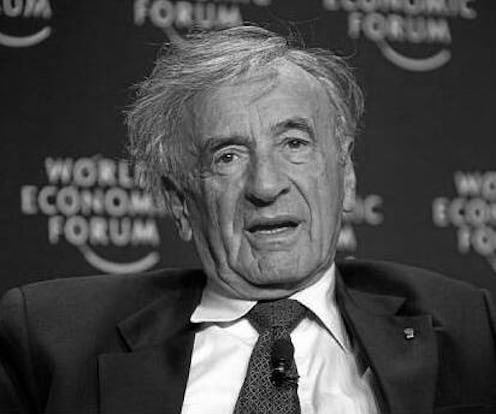Books
How Elie' Wiesel's 'Night' Shaped My Thinking

Elie Weisel has died, at 87 years old, years and years after living through one of the darkest periods in human history. He leaves behind a work that has changed many people's understanding of the Holocaust and of tragedy, and that will continue to leave a mark on people for years to come.
It's hard to understand the scope of tragedy when you're little. You know the word, you know it means something terrible to someone, but if we're lucky, it's not about us. Not personally. Not yet, at least. I was nine years old on 9/11, and even then I knew something terrible had happened, but I couldn't grab hold of it. I couldn’t grasp or even begin to know the how and the why behind something like that occurring. Big, world-shaking tragedies are like that for kids.
Growing up, I learned about the Holocaust. I knew what it was. I knew it was awful, and I knew that Hitler was one of the most despicable people of all time. But, for much of my young life, it was something we learned about in history class. It was incredibly sad, but it felt like something that happened so long and far away ago, it seemed almost impossible. Another world, somewhere else. History books are like that, though. Dry and one-sided. The facts, not the feelings.
We leave the feelings to books and literature. We look to English teachers to give us the human side of history; of life.
In eighth grade, we read Elie Wiesel's Night . A class assignment, just another book on a list, or so I thought. At the start, I know at 13 years old, that I was probably just grateful that it was short. I would have more time to read what I wanted. I never would have dreamed that a book as slim as Night would hold so much power. So much humanity and sorrow. So much suffering. I had known about the Holocaust. But I did not know what it felt like for a teenager who lived through it until I read Elie Wiesel's work of non-fiction.
Night was painful to read. It was so human, and so full of reality, that I found it hard to believe that we were not just allowed to read it at school, but assigned to read it. How could someone so young have lived through so much? I was used to only reading books like Number the Stars, about the Holocaust, nothing like this. As we read, we discussed. We felt, and we learned, and we experienced the human side of a tragedy, and I felt myself knowing, for once, what tragedy means. What suffering really is.
“Never shall I forget that night, the first night in camp, which has turned my life into one long night, seven times cursed and seven times sealed....Never shall I forget those moments which murdered my God and my soul and turned my dreams to dust. Never shall I forget these things, even if I am condemned to live as long as God Himself. Never.”
But, I did not just learn what it meant to suffer. I learned that it's possible to suffer and come out on the other side, having lost everything, and still manage to change the world. To write something that is big enough inside that it will stay with people long after they've closed the book. Elie Wiesel is still changing the world.
It's a hard thing to teach kids of just 12 and 13 about something as momentous and universally heartbreaking as the Holocaust. I admire teachers like mine who can do so in such a way to make us remember, years later at 24, how I felt when I read that book. The lessons held inside it about people, life, suffering, and love.
If there's just one thing that has stuck with and shaped me, maybe more than any Night, and there are many, it would be this quote from his Nobel Peace Prize acceptance speech:
“Human suffering anywhere concerns men and women everywhere.”
Image: Wikimedia Commons